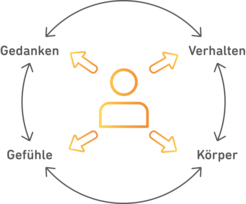
Behavioural Therapy
Behavioral therapy is based the idea that the way we think, feel, act and react to things physically all influence each other (see image below).
"Behavior" does not just mean the visible actions of an individual, but also the internal processes such as feelings, thoughts and physical processes. Over the course of life, everyone learns typical behavioral patterns, attitudes and emotional reactions through personal experience and imitation.
When depression develops, there are a number of typical thought patterns and behaviors which, together with severe stress or chronic stress, can lead to illness. In therapy, problematic behaviors, thought patterns and attitudes are specifically addressed and monitored. Therapy should enable individuals to change these patterns of behaviour, which are often habitual, unconscious and stand in the way of our well-being.
The goal of behavioral therapy is, among other things, acquiring skills to shape social relationships in a more successful and satisfying way, as well as dealing with one's own feelings. A further goal may be adressing past negative experiences, current crises and difficult life situations.

